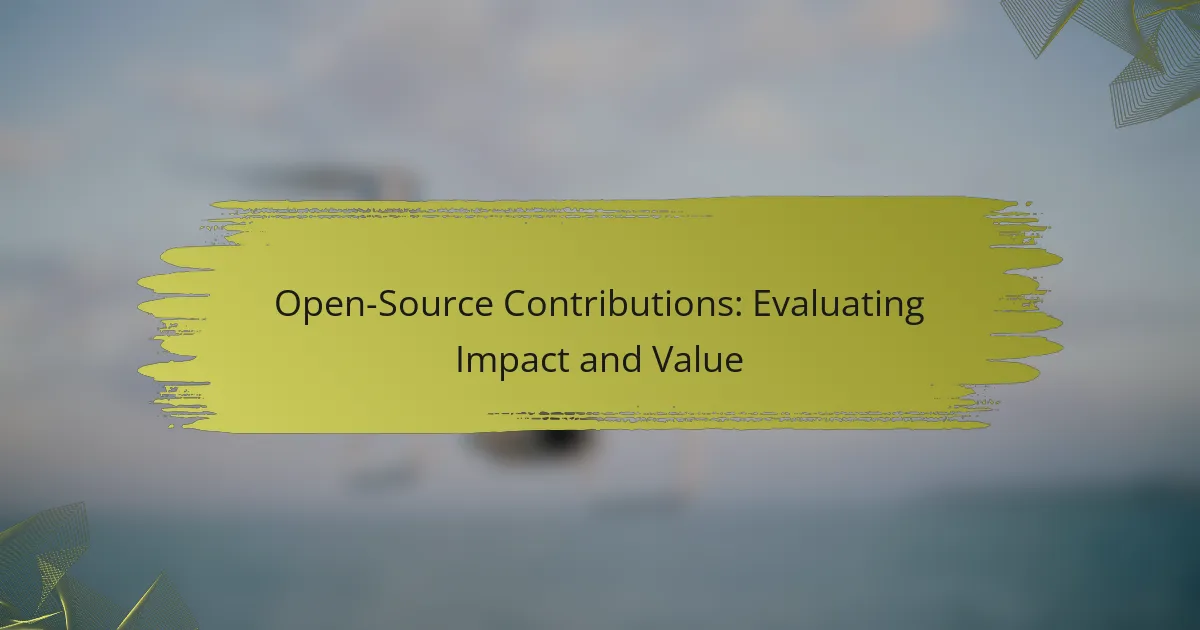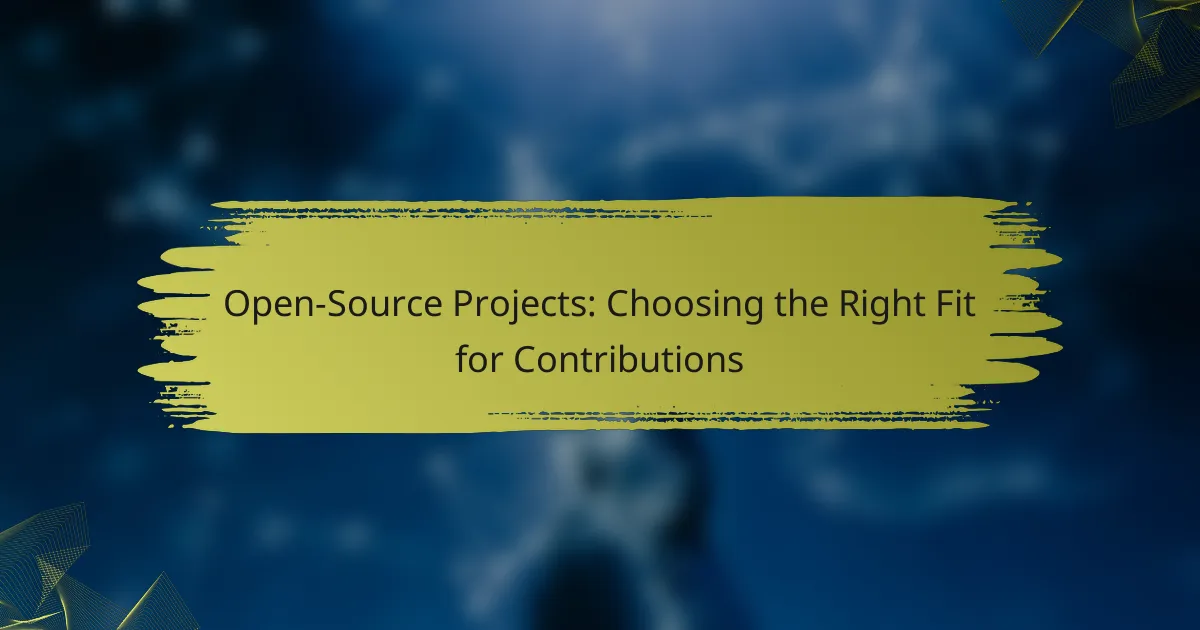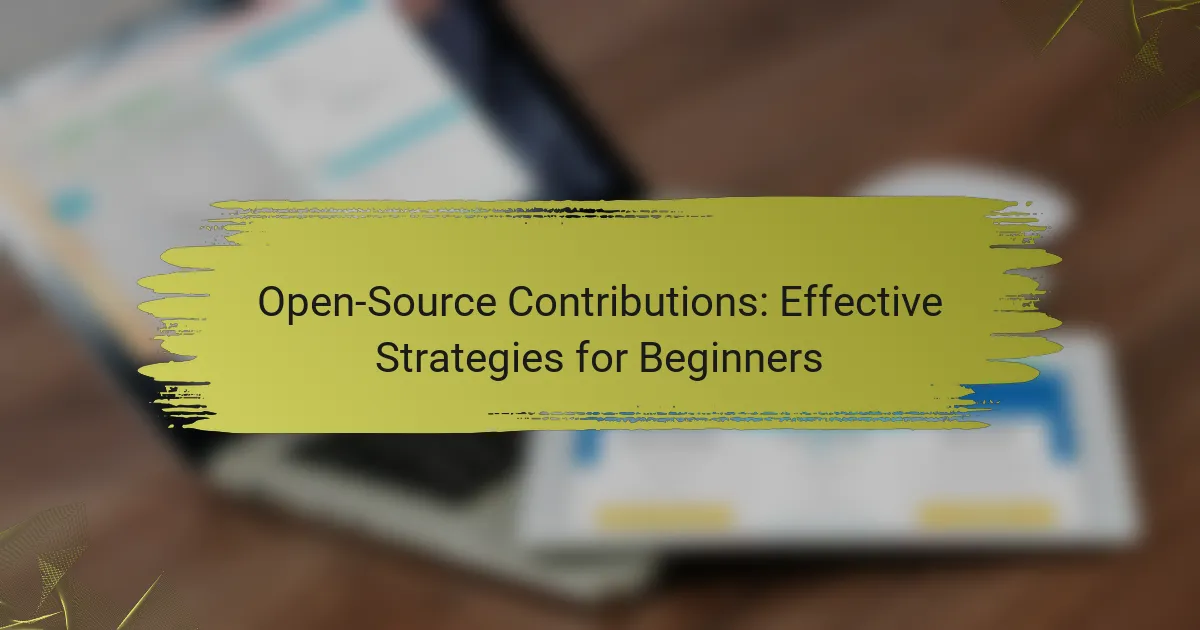Evaluating open-source contributions is essential for understanding their impact and value within projects and communities. By utilizing various frameworks and metrics, contributors can gain insights into how their efforts enhance software quality, foster collaboration, and drive innovation in the tech landscape.

How to Evaluate Open-Source Contributions?
Evaluating open-source contributions involves assessing their impact and value to the project and community. This process can be structured through various frameworks, metrics, and feedback mechanisms to gain a comprehensive understanding of contributions.
Impact assessment frameworks
Impact assessment frameworks provide structured methods to evaluate the significance of open-source contributions. Common frameworks include the Logic Model and the Theory of Change, which help identify objectives, activities, and expected outcomes. These frameworks can guide contributors and maintainers in aligning their efforts with project goals.
When using these frameworks, consider factors such as community engagement, project sustainability, and the long-term benefits of contributions. A well-defined framework can clarify the pathways through which contributions create value.
Quantitative metrics
Quantitative metrics offer measurable data to evaluate open-source contributions. Key metrics include the number of commits, pull requests, issues resolved, and lines of code added or removed. These figures can provide insights into the level of activity and productivity of contributors.
However, it’s essential to interpret these metrics with caution. High numbers may not always correlate with quality or impact. For instance, a single significant contribution can be more valuable than numerous minor changes. Balance quantitative data with qualitative insights for a fuller picture.
Qualitative feedback
Qualitative feedback is crucial for understanding the context and impact of open-source contributions. This feedback can come from code reviews, community discussions, or user testimonials. Engaging with the community through forums or social media can reveal how contributions are perceived and their real-world applications.
To gather effective qualitative feedback, encourage open dialogue and create an inclusive environment for contributors. Regularly solicit input from users and maintainers to identify strengths and areas for improvement in contributions, fostering a culture of continuous enhancement.

What are the benefits of contributing to open-source projects?
Contributing to open-source projects offers numerous advantages, including skill enhancement, networking, and portfolio development. Engaging in these projects allows individuals to gain practical experience while collaborating with a global community of developers.
Skill development
Participating in open-source projects significantly boosts technical skills. Contributors often work with various programming languages, frameworks, and tools, which helps them stay updated with industry trends. For example, a developer might enhance their proficiency in Python or JavaScript while contributing to a project.
Additionally, contributors can improve their problem-solving abilities by tackling real-world challenges. This hands-on experience is invaluable and often more effective than traditional learning methods.
Networking opportunities
Open-source contributions provide excellent networking opportunities with other developers, industry experts, and organizations. By collaborating on projects, contributors can build relationships that may lead to job offers, mentorship, or partnerships.
Attending open-source conferences and meetups can further expand these connections. Engaging with the community not only enhances visibility but also fosters a sense of belonging within the tech ecosystem.
Portfolio enhancement
Contributing to open-source projects allows individuals to create a robust portfolio that showcases their skills and experience. A well-documented contribution can demonstrate a developer’s ability to work on complex projects and collaborate effectively with others.
Moreover, having open-source contributions on a resume can set candidates apart in job applications. Employers often value practical experience and contributions to the community, which can lead to better job prospects and career advancement.

How do open-source contributions impact software quality?
Open-source contributions significantly enhance software quality by fostering collaboration, increasing code scrutiny, and accelerating innovation. These contributions lead to improved reliability, performance, and user satisfaction through collective efforts from diverse developers.
Code review processes
Code review processes in open-source projects are crucial for maintaining high software quality. Contributions are often scrutinized by multiple developers, which helps identify potential issues early. This collaborative review can lead to cleaner, more efficient code and adherence to best practices.
To maximize the benefits of code reviews, projects should establish clear guidelines and encourage constructive feedback. Regularly scheduled reviews can help maintain momentum and ensure that contributions align with project goals.
Bug detection rates
Open-source contributions can significantly improve bug detection rates due to the diverse perspectives of contributors. With many eyes on the code, bugs are more likely to be spotted and addressed quickly. This collective vigilance often results in faster resolution times compared to closed-source projects.
Projects can enhance bug detection by implementing automated testing and continuous integration systems. Encouraging contributors to write tests for their code can further reduce the number of undetected bugs, leading to a more stable product.
Feature enhancements
Feature enhancements in open-source projects often stem from community contributions that introduce innovative ideas and solutions. Contributors can rapidly implement new features based on user feedback, which can lead to a more responsive development cycle.
To effectively manage feature enhancements, projects should prioritize feature requests and maintain a clear roadmap. Engaging with the community through forums or issue trackers can help identify the most valuable enhancements and ensure that contributions align with user needs.
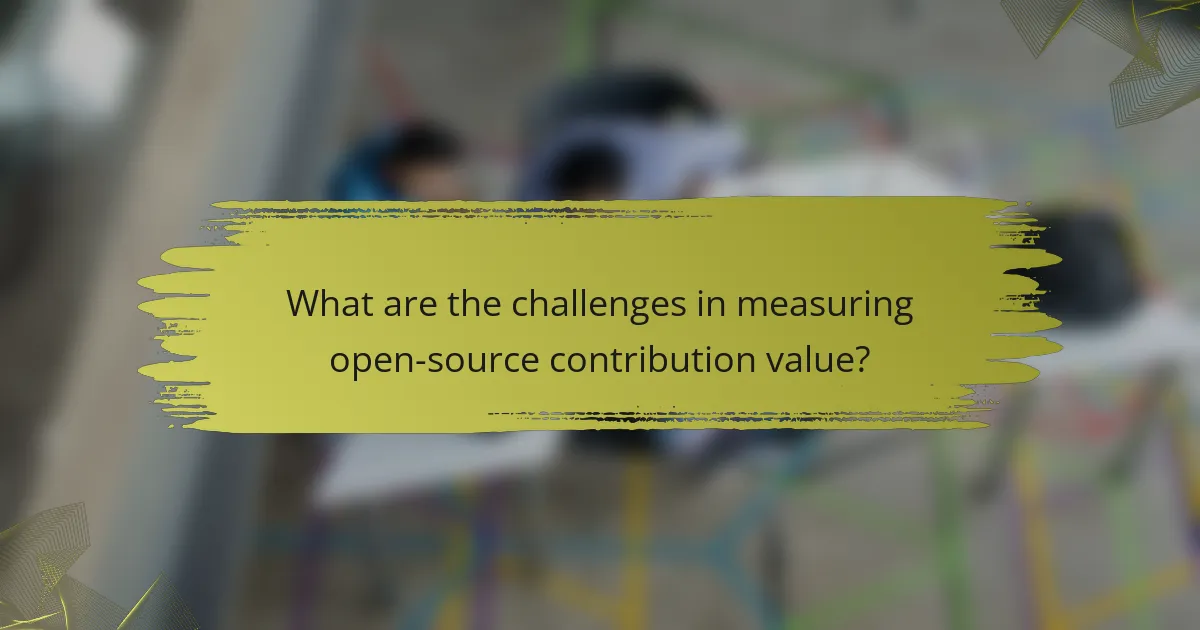
What are the challenges in measuring open-source contribution value?
Measuring the value of open-source contributions presents several challenges, including attribution issues, data availability, and subjectivity in evaluation. These factors complicate the assessment of individual contributions and their overall impact on projects.
Attribution issues
Attribution issues arise when it is difficult to determine who contributed what to a project. In open-source environments, multiple contributors may work on the same code, making it challenging to assign credit accurately. This can lead to undervaluation of individual contributions, as some may not receive recognition for their efforts.
To mitigate attribution problems, projects can implement clear contribution guidelines and maintain detailed commit histories. Tools like Git can help track changes and contributions, but they require consistent usage and transparency from all contributors.
Data availability
Data availability is another significant challenge in evaluating open-source contributions. Many projects do not maintain comprehensive records of contributions, making it hard to assess the full scope of an individual’s impact. Additionally, some contributions may occur off-platform, such as in discussions or documentation, which are often overlooked.
To improve data availability, projects should encourage the use of contribution tracking tools and maintain up-to-date documentation. Regularly archiving project activity and contributions can also enhance visibility and facilitate better evaluation.
Subjectivity in evaluation
Subjectivity in evaluation refers to the varying interpretations of what constitutes valuable contributions. Different stakeholders may prioritize different aspects of contributions, such as code quality, documentation, or community engagement. This can lead to inconsistent assessments of an individual’s value to a project.
To address subjectivity, establishing clear criteria for evaluation can help standardize assessments. Utilizing peer reviews and feedback mechanisms can also provide a more balanced perspective on contributions, ensuring that all aspects of a contributor’s work are considered fairly.

What frameworks exist for assessing open-source contributions?
Several frameworks help evaluate open-source contributions, focusing on quality, impact, and community engagement. These frameworks provide guidelines and metrics to assess the value of contributions effectively.
Open Source Initiative (OSI) guidelines
The Open Source Initiative (OSI) provides a set of guidelines that define what constitutes open-source software. These guidelines emphasize the importance of transparency, collaboration, and community involvement in assessing contributions.
When evaluating contributions, consider whether the project adheres to OSI-approved licenses, which ensure that the software remains open and accessible. This adherence can be a strong indicator of the project’s long-term viability and community support.
Community feedback loops
Community feedback loops are essential for assessing the impact of open-source contributions. These loops involve gathering input from users and contributors to understand how changes affect the project and its users.
To establish effective feedback loops, encourage regular communication through forums, issue trackers, and social media. This engagement can help identify valuable contributions and areas for improvement, fostering a more robust and responsive development environment.
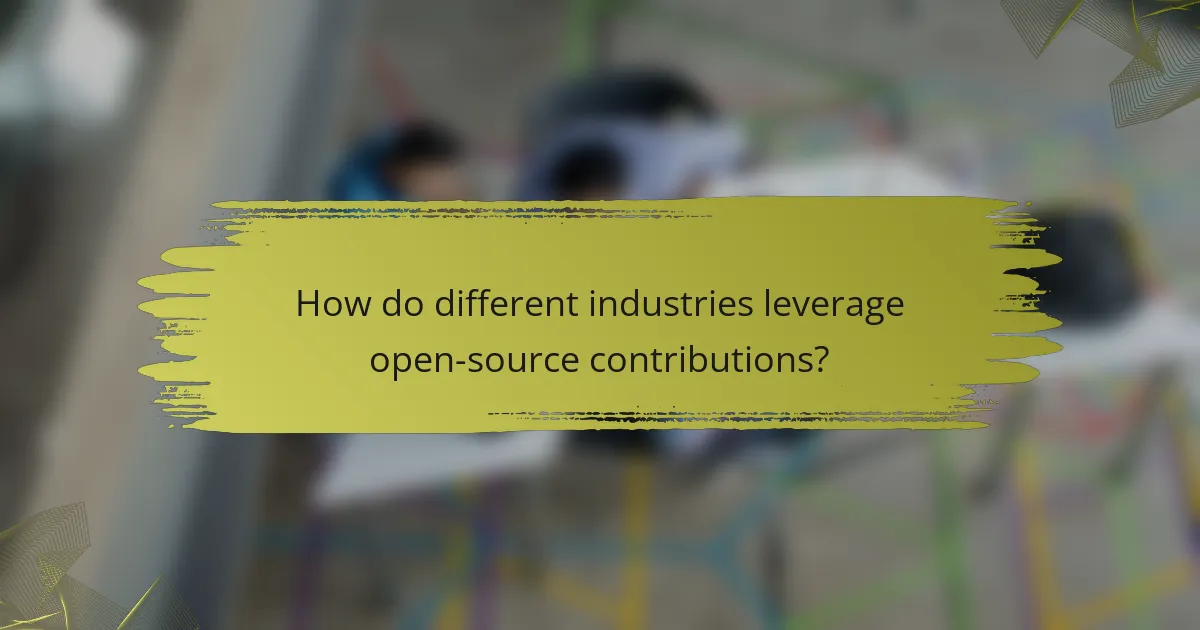
How do different industries leverage open-source contributions?
Various industries utilize open-source contributions to enhance innovation, reduce costs, and foster collaboration. By engaging with open-source projects, organizations can access a wealth of shared knowledge and tools that drive efficiency and adaptability.
Technology Sector
The technology sector heavily relies on open-source contributions to develop software and tools. Companies like Google and Microsoft contribute to projects such as Kubernetes and Visual Studio Code, respectively, which allows them to benefit from community-driven improvements and innovations. This collaboration often leads to faster development cycles and more robust software solutions.
Healthcare Industry
In healthcare, open-source contributions are used to create software that improves patient care and data management. For instance, platforms like OpenMRS provide customizable electronic medical record systems that can be adapted to local needs. This flexibility is crucial in regions with varying healthcare standards and practices.
Education Sector
The education sector leverages open-source contributions to develop learning management systems and educational resources. Projects like Moodle offer free platforms for institutions to create customized learning environments. This accessibility helps reduce costs for schools and enhances educational opportunities for students worldwide.
Finance and Banking
Open-source contributions in finance and banking focus on building secure and transparent systems. Tools like Apache Kafka are used for real-time data processing, which is essential for fraud detection and risk management. By adopting open-source solutions, financial institutions can improve their operational efficiency while maintaining compliance with regulations.
Government and Public Sector
Governments utilize open-source contributions to promote transparency and citizen engagement. Initiatives like the Open Government Partnership encourage the use of open-source software for public services, allowing for greater accountability and collaboration with citizens. This approach can lead to more responsive governance and improved public trust.
